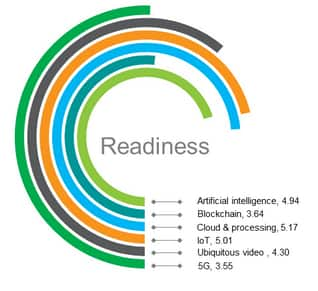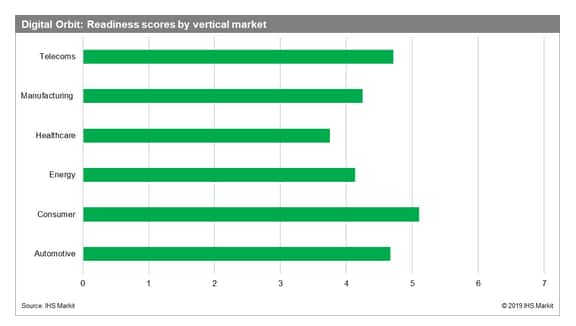The next-generation mobile standard known as 5G is finally
becoming more widely available after initial deployment in late
2018, and more 5G mobile launches are set to take place this year
in various parts of the world.
But while eagerly anticipated by consumers craving an enhanced
mobile experience, 5G had the lowest readiness score among the six
transformative technologies tracked by Digital Orbit, as shown by
the graphic below. Such a finding may seem surprising given the
flurry of industry activity around 5G and the of media attention
lavished on the technology.
Yet, a closer examination reveals the reasons accounting for
5G's low score on readiness, a key metric in Digital Orbit that
rates the transformative technologies deemed most ready for
adoption by the six industries covered in the research.

The benefits of 5G
5G is significant because it brings three compelling benefits:
faster data speeds, lower latency, and increased connectivity. And
what couldn't be done with older technology will now be possible as
5G enables altogether new use cases; examples include driverless
cars, immersive entertainment and virtual reality with zero delay,
uninterrupted video, and gaming with practically no latency. On the
industrial front, 5G will be key to expanding and realizing the
full promise of the Internet of Things (IoT), with the technology's
impact to be felt in smart homes, smart cities, and smart
industries.
Even so, the full range of planned 5G capabilities will not be
available during initial launches. In fact, many key features most
frequently associated with 5G—such as ultra-reliable
low-latency communications (URLLC)—won't be ready within the
next 18 months. Instead, the wider range of 5G capabilities will
unfold in a phased approach over the next few years.
In the readiness measure, 5G's scores were low in two specific
criteria: overall technical development and ease of implementation,
as the graphic below shows. This is understandable: More work is
still needed to fully develop the 5G standard, and implementation
will be complex and add to costs. Among verticals, 5G scored lowest
in healthcare as well as manufacturing—two industries where 5G
capabilities, especially in URLLC, are yet to take hold.

The low readiness scores of 5G, however, should not be viewed as
a negative. The initial release of any technology is rarely
revolutionary, and 5G's current functionality will soon give way to
truly transformative experiences, especially in applications that
utilize frequencies above 6GHz, the critical tipping point for the
band of spectrum known as millimeter wave, or mmWave.
And because Digital Orbit scores are fluid, current technologies
like 5G at the lower end of the readiness scale are also the ones
most likely to see the greatest upsurge in the immediate future.
With 5G, its readiness level could see the most sizable leap in the
next 12 months, bolstered by further industry support, an expected
increase in the deployment of 5G networks, and a growing number of
5G-enabled devices and hardware.
5G scores better on impact
Digital Orbit's scores for 5G are better in the second key
measure of impact, or how a technology changes an industry. Nearly
80% of key influencers stated they expect 5G to exert a
high-to-significant impact on their industries within the next
three years.
While there is a divergence in viewpoints between users and the
analyst community in their assessment of 5G's impact, the variance
can be attributed in part to the considerable amount of hype that
5G has generated, which has ostensibly led to premature
expectations on what the new technology can do for business and
trade.
But as the first real-world implementations of 5G unfold next
year, Digital Orbit's 5G results will settle into a more
appropriate range—one indicative of the technology's truer
standing.
Jenalea Howell is director of Transformative Technologies
research at IHS Markit
Posted 11 June 2019
Source link